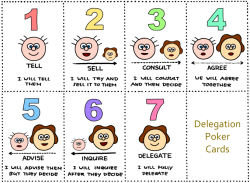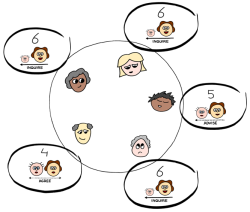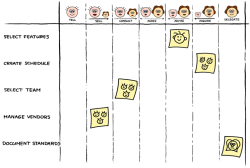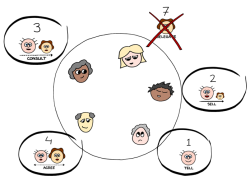Update 6 May 2013: There is a new design available for the Delegation Poker cards.…
Delegation Poker (Game Description)
Update 6 May 2013: There is a new design available for the Delegation Poker cards. You can download the new Delegation Poker cards here.
Next you need to prepare a plan, as you will write the essay. In it you should prepare large chapters. They should be logically consistent. You should try to cover your topic gradually. Let’s give you some examples. You must keep the plan in your head in order to act approximately like this: first I will write this, then this, and I will finish with this. Of course, the plan will form the basis of the content. However, it also includes write a 250-word essay in which you trace the development of the theme of conflict in “two kinds.” a division into paragraphs, i.e. small parts. For example, the chapter “Stages of Democracy in USA” can be divided into paragraphs.
The Delegation Poker game was first played at the Scrum Gathering in Amsterdam. Since then I had people play it in a number of workshops, and I improved it with their feedback. Here is the first full description of the game.
Purpose of the Game
I came up with the idea for Delegation Poker when I tried to create a game that would teach people the following ideas (learning objectives):
- Delegation is not a binary thing. There are plenty of “shades of grey” between being a dictator and being an anarchist.
- Delegation is a step-by-step process. You hand over accountability to other people, in a controlled and gradual way.
- Delegation is context-dependent. You want to delegate as much as possible; but if you go too far, chaos might unfold.
The basis for the Delegation Poker game is the idea of The 7 Levels of Authority, described briefly in my presentation Authority & Delegation, and more elaborately in my article The Seven Levels of Authority. And of course in my book Management 3.0. (It is a typical example of idea farming, where I mixed together ideas from various sources, like in this case Situational Leadership, the RACI matrix, and Key Decision Areas, and allow something to emerge that (I believe) improves on all of them.)
The 7 Levels of Authority
- Tell: make decision as the manager
- Sell: convince people about decision
- Consult: get input from team before decision
- Agree: make decision together with team
- Advise: influence decision made by the team
- Inquire: ask feedback after decision by team
- Delegate: no influence, let team work it out
Setup of the Game
 Participants should be organized in groups of three to seven people. Each participant gets a set of cards numbered 1 to 7. (I carry my own cards with me when I do a course. Of course, it is also easy to let people self-organize and create playing cards out of white paper, sticky notes, or the CEO’s business cards.)
Participants should be organized in groups of three to seven people. Each participant gets a set of cards numbered 1 to 7. (I carry my own cards with me when I do a course. Of course, it is also easy to let people self-organize and create playing cards out of white paper, sticky notes, or the CEO’s business cards.)
It is useful to have a paper with a set of pre-defined cases for people to discuss. For example, in my workshops I give people 10 “management stories”. This is one such story:
You wish to involve existing team members in the recruitment and hiring of new employees. What authority level will you give them for decisions concerning various job candidates?
Last of all, it is important that participants can refer to the 7 levels of delegation while they’re playing the game. I usually show the 7 levels projected on the wall. A handout is also quite useful.
Rules of the Game
The participants will (repeatedly) perform the following steps:
- One person picks a story (from the pre-defined cases) and reads it out loud OR he/she tells a story from personal experience.
- Every player chooses privately one of the 7 cards, which reflects how they would delegate the decision in that particular case.
- When all players have decided, they show their selected card.
- Everyone earn points according to the value of their selected card, except the players that are the “highest minority” (see below).
- Let the people with the highest and the lowest cards motivate their choices.
What is the “highest minority”?
The idea in this game is to incentivize managers to delegate as far as possible, however without going too far! (I often use the metaphor of driving fast without exceeding the speed limit.) Therefore, each person earns points according to his card’s face value. The higher the number on the card the more points the player earns. But… If the players with the highest card in the group form a minority, we say they went too far. They exceeded the consensus of the group, and invited chaos. They get no points at all!
All players select a different card, with 7 (delegate) being the highest.
Because this highest card is a minority in the group, this person earns no points. The others earn points as indicated by the value on the card (1, 2, 3 and 4 points respectively).
Example 2:
 Three players select 6 (inquire), one player chooses 5 (advise) and one player chooses 4 (agree).
Three players select 6 (inquire), one player chooses 5 (advise) and one player chooses 4 (agree).
The highest card (6) is still a majority in the group, and therefore everyone earns points. Three players earn 6 points. The others earn 5 and 4 points respectively.
The game is played for approximately half an hour, or until the teams have finished 10 stories each.
Game Variants
 Since the first time people played this game, a number of variants have emerged. In no particular order:
Since the first time people played this game, a number of variants have emerged. In no particular order:
- You can choose to work with or without points. Some groups enjoy the discussions most, while for others the competition (who is the most Agile manager?) adds a lot to the fun.
- You can suggest that groups play the game again for the same story, when the difference between the highest and lowest cards is high.
- You can let groups focus on pre-defined cases, or focus on people’s own stories, depending on the type of workshop.
- You can use other definitions of “highest minority”. (In example 1, both cards 4 and 7 can together be considered a minority. While card 3 is the highest card which is still part of a majority. But it appears that many people find this confusing.)
- You can let groups create an authority board, where they visualize which decisions they have made together, by consensus.
Suggestions?
If you have suggestions on how to further improve the Delegation Game, feel free to let me know.
The Delegation Game is part of the Agile Management course, developed by Jurgen Appelo. Check here for dates and locations.





